Financing an innovative low-carbon economy is one of the defining challenges of our age, as Bill Gates argues in his new book. Energy transition will require $3.5 trillion annually — for decades. As we emerge from the pandemic, defining what counts as a green investment around the world will take on even greater significance. It’s crucial to ensuring we really do create a better future from this crisis and avoid falling into the greenwashing trap.
In the race to net zero, the European Union should have a head start in setting those standards given many years of investor interest. Its new rules requiring asset managers to disclose the environmental, social and corporate governance features of their funds started to take effect this month. But the bloc still hasn’t agreed on the list of categories and definitions of what’s green and what’s not — known as the green taxonomy — that’s supposed to underpin the effort, and to become a global standard.
Brussels has gotten bogged down in the details and a noble, but self-defeating desire to create an exhaustive, one-size-fits all solution. Debate over what should qualify as green, especially around gas, has become a political hot potato. Investors and companies are beginning to fret about how they will put into action technical guidance that runs to 593 pages so far.

















With your current subscription plan you can comment on stories. However, before writing your first comment, please create a display name in the Profile section of your subscriber account page.